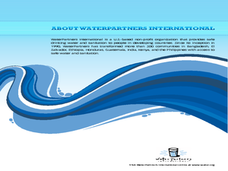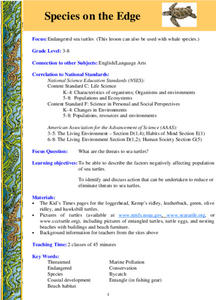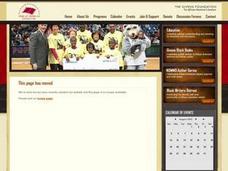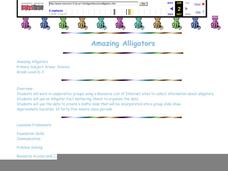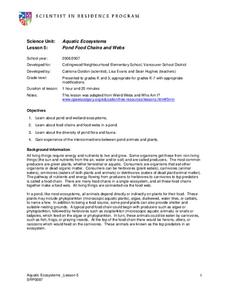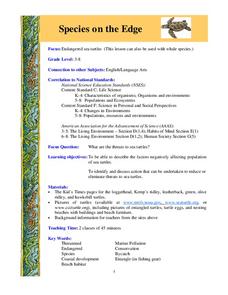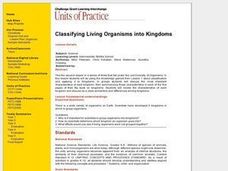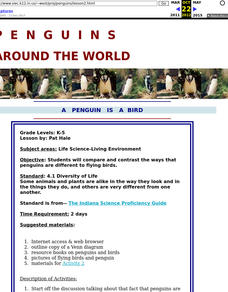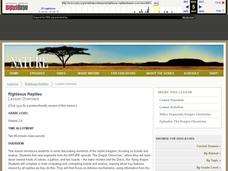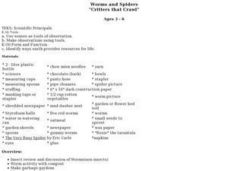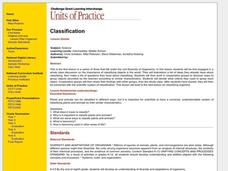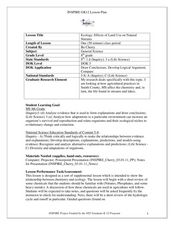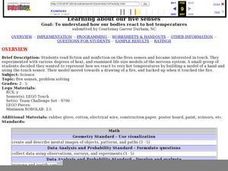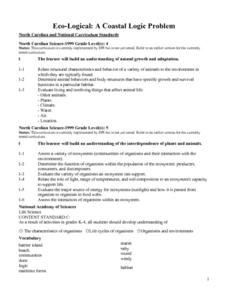Curated OER
Walking For Water
Students investigate how third world countries get their water. In this water lesson plan, students research how countries like Kenya and Ethiopia get their water supply. Students participate in an experiment to role play how difficult...
Curated OER
Species on the Edge
Students describe factors negatively affecting population of sea turtles, and identify and discuss action that can be undertaken to reduce or eliminate threats to sea turtles and other endangered species.
Curated OER
Investigating Stereotypes
Learners study 'stereotype' in literature and life and give examples. they provide examples from life or literature on the origins and impact of stereotypes. they
3. Cite 3 - 5 individual African Americans from literature or life who...
Curated OER
Fred the Fish -- A River Ran Wild
Students apply cause and effect relationships to water pollution in a stream. In this pollution lesson students recognize the importance of clean water in their daily lives. Students accompany "Fred the Fish" as he travels down stream....
Curated OER
Amazing Alligators
Students uncover facts about the alligator: including but not limited to habitat, characteristics, food, traits, habits, offspring and interesting facts.
Curated OER
The Things We Do
Fourth graders conduct a literature study in order to investigate the concept of change and how it occurs in the environment. The teacher uses the method of concept development for investigation.
Curated OER
Interdisciplinary Approach to Investigating Popcorn
Young scholars conduct a lab experiment using the scientific method. In this interdisciplinary lesson plan, students will test the difference in popping white and yellow corn. Young scholars will write their lab report in their science,...
Curated OER
Hide In Plain Sight
Students view video clips and use the Internet to look for hidden animals. They then use the Internet to print out animal shapes and color them. They create environments on construction paper in which their animals can hide.
Curated OER
How Does a Green Plant Grow?
Students of all ages can explore the question "how do seeds grow?", design an experiment to answer the question, predict the outcome of the experiment then conduct the experiment.
Curated OER
Aquatic Ecosystems
Students study ponds and wetland ecosystems and examine the food chains and webs in them. In this aquatic ecosystems lesson students answer questions about the diversity of the flora and fauna in a pond.
Curated OER
Walking for Water Mini-Unit
Students participate in an activity that requires them to consider the availability of water. In this "walking for water" lesson, students read "Women Bear the Weight of Water," and respond to discuss questions regarding the article....
Curated OER
Species on the Edge
Students examine sea turtles. In this endangered species instructional activity, students analyze sea turtle habitats. Students hypothesize why sea turtles could go extinct.
Curated OER
Classifying Living Organisms into Kingdoms
Students create a flip book that describes the basic characteristics of the five main animal kingdoms. They research the animal kingdoms, include examples of organisms for each kingdom and illustrate the finished text.
Curated OER
A Penguin is a Bird
Students compare and contrast the ways that penguins are different to flying birds.
PBS
Righteous Reptiles
Young scientists write and draw about their knowledge of reptiles. They also view a nature video focusing on lizards and snakes, complete a chart comparing and contrasting them. Next, they focus on the defense mechanisms...
Curated OER
Bats, Bats, Everywhere!
Students research information on bats while working in cooperative groups. They design posters with the information from their research.
Curated OER
How Does a Green Plant Grow?
Students examine how a seed grows, and design an experiment to explore this concept. They make predictions, conduct the experiment, record the results, and interpret the results.
Curated OER
Worms and Spiders: "Critters That Crawl"
Pupils complete a unit of lessons on spiders and worms. They discuss worm and spider characteristics, create a garbage garden, observe worms, create gummy worm prints, read the book, 'The Very Busy Spider,' and construct a spider and...
Curated OER
Classification
Students investigate how to classify items based on similar characteristics. They study the scientific system of classification.
Curated OER
Make a Cast of a Tyrannosaurus rex Fossil
Second graders examine the formation of fossils and list the different types. They make cast model of a dinosaur fossil. They write about conditions that are necessary for fossils to form and create a model of a buried fossil.
Curated OER
Ecology: Effects of Land Use on Natural Streams
Eighth graders examine how humans affect various ecosystems. In this ecology lesson, 8th graders discuss different ways that contaminants enter the stream. They explain the consequences of eutrophication in lakes.
Curated OER
Learning About Our Five Senses
Students study the sense of touch and various degrees of heat. They design a model that displays how the human hand reacts to heat using a touch sensor.
Curated OER
Eco-Logical: A Coastal Logic Problem
Fourth graders study the characteristics of five coastal communities. They use logic cards and matching activities to identify the proper community for plant and animal species.
Curated OER
Classifying Organisms within Kingdoms
Students examine animal kingdom classifications. They discuss how animals are placed into kingdom classifications and compare similarities and differences of animals within a kingdom.


